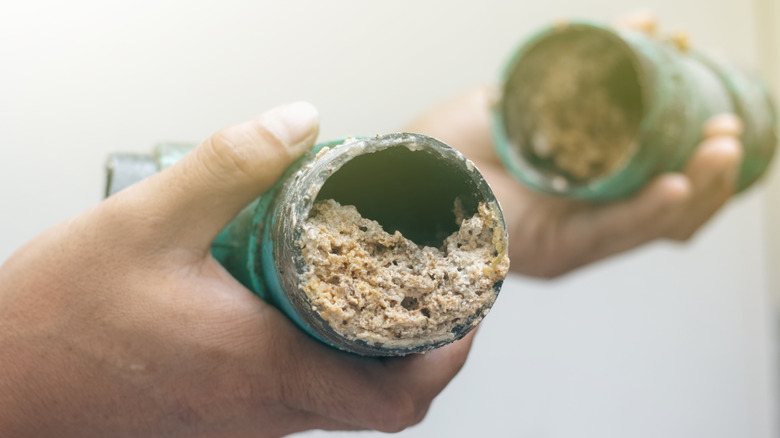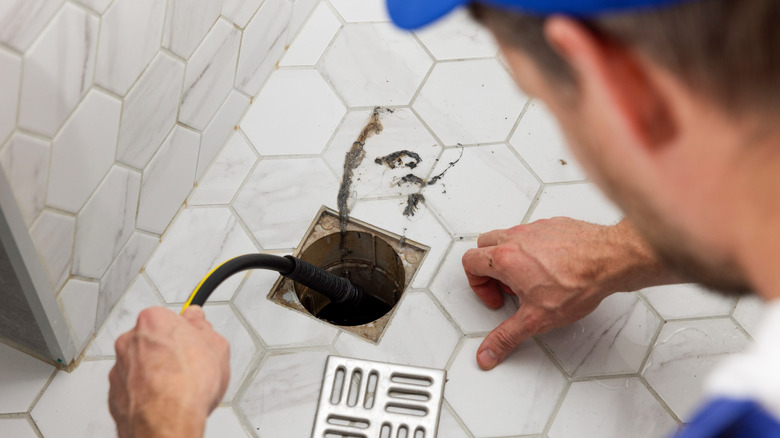Is Shower Oil Safe For Bathroom Drains Or A Plumbing Disaster Waiting To Happen?
Whether you suffer from sensitive skin, want to soothe sore muscles, or need to reduce stress, it's tempting to reach for a scented shower oil. Like some hydrating body washes or hair products, many shower oils contain various vegetable, seed, or nut oils like avocado, coconut, or sweet almond. They also typically contain small amounts of surfactants (the soapy part), that help to dissolve dirt while showering. Despite the delightful scent and skincare benefits they offer, shower oils aren't all that safe for drains. According to Frontdoor Plumbing Expert Eddie Linares, they can quickly become a plumbing disaster because of buildup that causes clogs, and ingredients that can interfere with your septic tank.
"Anything put down a drain, other than water, has the potential to cause plumbing problems that can lead to costly repairs or maintenance," Linares told House Digest during an exclusive interview. "Shower oils are no different as the oil content can stick to and build up on the inside of the pipes, leading to the potential of clogs." The plumbing expert said that after enough shower oil has collected and congealed, you'll have to unclog your shower drain with a snake or hire a pro to handle it for you.
Linares cautioned that using shower oil is an especially bad idea if you have galvanized piping or a septic system. "If you have older piping ... depending on the amount of build up, it can lead to having to replace sections of the pipe," he explained. He added that shower oil also often disrupts the natural breakdown process that's constantly occurring inside of a septic tank, which can lead to complex and costly repairs.
Run hot water down your drain after using shower oil
If shower oil is an important part of your routine, you may be reluctant to stop using it entirely. According to Eddie Linares, there are some ways to minimize its harmful effect on your bathroom drains. "If you do use shower oil, make sure to use it sparingly," he told House Digest during his exclusive interview. Linares said to remember the old adage "a little goes a long way."
The plumbing expert also recommended always running very hot water down the drain for a few minutes after using shower oil. "Make sure the shower oil remains in a liquid state as it drains, which will allow it to make its way through the drain system easier," he explained. Tropical oils like coconut and palm kernel oil, which are common ingredients not just in shower oils but in many bath care products, are solid at room temperature, making this an important step — especially if you use a large amount of oil during your shower. "If the oil sits in your drainpipes, it is possible it can solidify in pipes and cause potential drain issues when it cools down," Linares said, comparing it to what happens when you pour grease down your drain.
"One way to minimize the impact of shower oils is to use a drain catcher to minimize the amount of oil that goes down the drain," Linares suggested. The expert said they'll also collect hair and soap buildup that can combine with the oil to create a sticky mess inside your pipes. "Also make sure to use water soluble shower oils," he suggested.
Limit the amount of shower oil you use
Although it can be tempting to load up your sponge, loofah, or pouf with a ton of your favorite shower oil, Eddie Linares told us you should avoid overdoing it. "When using shower oils, it is important to remember to use no more than the recommended amount as described on the product," he said during his exclusive interview with House Digest. Along with creating clogs, using too much oil can make the floor dangerously slippery and create a film that makes it hard to keep your shower squeaky clean. Use as little as possible, anywhere from a few drops to a tablespoon. You should skip it entirely when taking a cold shower since that is likely to make the oil solidify in your pipes faster. "When you do use shower oil, make sure to only use hot water and a hair catcher to minimize the impact it can have on your drains," Linares advised.
If you start to notice that your shower is taking a long time to drain or you find yourself standing in water, your bathroom drain is probably clogged. There are some simple all-natural ingredients you can use to clear your clogged drain. Carefully pouring a pot of boiling water down the drain, followed by baking soda and vinegar, and another pot of hot water, may be enough to liquify clogs made of hair, debris, and shower oil so that they pass through the drain. But for stubborn shower oil clogs, Linares said there's a faster way to get your plumbing disaster fixed: "Contact your plumber."


